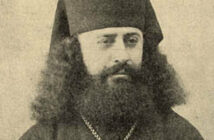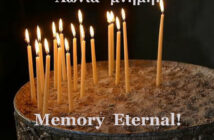Source: The National Herald
When our forefathers immigrated here near the turn of the 20th century, they generally desired to maintain their Hellenism in America. Like people everywhere, Greeks hold fast to their inherited traditions, having protected them through centuries of inordinate persecutions in the Ottoman Empire. Understandably, these immigrants intended to perpetuate their culture and religion in their new country and accordingly established, in nearly every locality they stepped foot, local societies devoted to that task. These societies, which sponsored Greek schools, community centers, and churches, later transformed themselves into parishes, creating the Greek Orthodox Archdiocese of America we know today.
The origins of our parishes explain their dual-role as religious and cultural-community centers. The local Greek societies transformed themselves into ‘parishes’, maintaining their cultural-community branches under this new name, at the behest of future Ecumenical Patriarch Athenagoras. Athenagoras promised that the new Archdiocese would protect these cultural-community functions, and each succeeding archbishop has reiterated this promise: that the Archdiocese will serve, in Bishop George Papaioannou’s words, as “the guardian of Hellenism in America.”
Yet in recent decades, we’ve seen attacks on Hellenism in the Archdiocese. Some, like the releases of Orthodox Christian Laity (OCL), have been explicit. Others have been subtle, under the slogans of ‘pan-Orthodoxy’, ‘evangelization’ or ‘growth’. Every churchgoing Greek-American has heard such statements from bishops, priests, or lay-leaders and understood their import: that, in our Archdiocese, Hellenism’s days are numbered. Churchgoers have also encountered silence bearing the same import. In the silence of leaders on Hellenism – in their hesitance to publicly affirm it – churchgoers have drawn the same conclusion.
The reasons underlying opposition to Hellenism vary. Some predict the Greek-Americans will disappear, assimilating into the wider American monoculture, especially through intermarriage (an attitude Archbishop Iakovos called ‘defeatist’). Others, pouring over metropolis and parish budgets, see the solution to financial problems in new, non-Greeks bringing their money with them. Hellenism, in their eyes, is thus an obstacle to ‘growth’. Some argue that parishes are theologically-obligated to eliminate ethnic affiliation; while others, more diffidently, struggle with a faint sense of embarrassment for their Hellenism, often brought on by different manifestations of nativism and minority-group anxieties. In short, the opposition to Hellenism is varied and emerges from a variety of directions.
While these different forms of opposition arise from real anxieties, they all contradict the original promise of Athenagoras, upon which generations of Greek-Americans have relied. For over a century, Greek-Americans have poured their efforts and resources into their local parishes, assuming that the parish will serve as their communal center. To oppose Hellenism in the Archdiocese – to argue for its eradication, dilution or gradual extinction – is to retract this promise. It is to rescind an agreement Greek-Americans long ago struck with this Archdiocese (understanding it to be a perpetual one), and to abdicate the accompanying responsibility the Archdiocese assumed. It is further to take away from Greek-Americans their central institutions and invite the likely consequences: the breaking-up of Greek communities and the loss of their traditions, especially in the more remote areas of the country (like my hometown, Omaha).
This is tragically unnecessary, as there are better routes ahead – routes which protect Greek parishes. We can leave Greek parishes intact, allowing them to pursue their dual-role, while creating new ‘Anglophone’ parishes alongside them. Already, we see such parishes springing up, comprised mostly of non-Greeks with non-Greek priests, practicing an English-language liturgy and understandably opposing Greek cultural functions. These parishes make positive contributions to our Archdiocese. But so, too, do our Greek parishes. Many young Greek-Americans wish to reinvigorate their parishes, fortifying them to thrive in the 21st century as refreshed Greek cultural-community centers. These parishes are treasures deserving protection, and they can collaborate with Anglophone parishes to fully address the interests of each while participating in the broader ecumenical movement.
We can lay the foundations for this future now. The Archdiocese could designate its Greek parishes and train seminarians for the dual-role of the Greek priest, who is both liturgist and community leader. The Archdiocese could assign these parishes priests and chanters from Greece, ready to provide a fluent Greek liturgy, teach Greek letters and lead Greek-American communities. The Archdiocese could also bring these parishes into deeper collaboration with the Greek state and non-governmental agencies, providing them with much-needed support.
It is fully within the rights of Greek-Americans to advocate such innovations within the Archdiocese. Too often, we struggle with timidity, anxious that advocacy contradicts religious piety or is even prejudicial to others, as a form of ‘ethnocentrism’ or ‘non-inclusivity’. None of this is true. As Greek-Americans, we can rightfully maintain our Hellenism through our parishes. This, after all, was the vision our forefathers had for our parishes. When we dream of parishes mobilizing their full forces toward Hellenism, we keep that vision alive.
Nikolaos Piperis is a lawyer in Omaha, Nebraska. After graduating from Boston College with an MA in Philosophy, he became a full-tuition Creighton Scholar at the Creighton University School of Law, graduating with a JD in 2023. He currently serves on the board of directors at St. John the Baptist Greek Orthodox Church in Omaha and as chairman of the parish’s Archive Committee, tasked with creating a historical archive of the Greeks of Omaha.





15 Comments
As a new graduate from good schools, the author surely knows that “Hellenism” refers to Ancient Greek culture and ideals, including polytheistic and animistic worship, devotion to or imitation of ancient Greek thought, customs ands style.
The use of Hellenism by the author is code for modern Greek language and culture. His role as chair of the archives committee of his parish explains his focus on the past, when immigrants spoke little or no English and looked to each other and their village clubs and parishes for comfort and support.
After several generations, intermarriages and demographic changes, the reality is that we are no longer an immigrant church.
Pan-Orthodoxy, evangelization and growth are not slogans. And, yes, Ethnocentrism is a heresy.
Using the church to promote and preserve a foreign language and culture in America cannot be justified under any understanding of Orthodox ecclesiology.
The author speaks only about the “Greek” Archdiocese, apparently unaware of the many other Orthodox Churches in America and the mandate of the Assembly of Bishops to resolve the uncanonical status of the church in North America. A visit to OCA, Antiochian and other Orthodox parishes in Omaha and elsewhere will broaden the understanding that there are Orthodox in America who are not “Greek.”
Bringing priests and chanters to America from Greece does nothing to bring the message of Orthodoxy to America. They will not re-evangelize the children and grandchildren of the immigrants who have left and continue to leave because they can get ethnic food and festivals elsewhere, and they are not being fed the Word in a language they understand in “dual-purpose” parishes.
You are correct in everything you write. I am so disappointed in the article, written by a young, intelligent and well-educated man blathering on and on about preserving Greek culture. Preserve it by all means, and I wish you well, just not in the Church. Have your cultural centers and Greek language schools separate from the Church.
I had the misfortune, as an elder American convert, to stumble upon one of the Greek Orthodox Churches run by people like the author of the article. I had a very hurtful experience because of the “Greekness” and now attend an OCA parish that is welcoming and where I can grow spiritually.
The author of the article is quoting Jesus, but He does not approve of what you are doing. He sent the Apostles to preach to all nations; the Lord Jesus Christ said nothing about xenophobic culture clubs. My former Greek parish has an American born head priest and a priest from Greece. The priest from Greece thinks he was ordained in order to promote Greek language and culture and pump up the Byzantine Empire. His wife runs the Greek School and is horribly rude to converts.
It is blasphemy what they are doing in the parish where I was baptized and chrismated, and it is a tragedy that people like the article writer continue to defend it.
Cato, how do you re-evangelize an individual? It seems to me that a person has either been evangelized or not. I assume you would agree that there is no such thing as a dual purpose parish. Jesus stated that you cannot serve 2 masters because you will love one and hate the other.
I appreciate Mr. Piperis’ letter but it misses the longstanding points that our beloved Archbishop Iakovos made with much insight into the goals of the Orthodox Church in America. I quote from The Vision of Iakovos, published by Light and Life Publishing. “Yesterday we were considered a very important Church of a particular ethnic group. Today we are looked upon as a noteworthy Church with ethnic values.” He makes it clear that in our relationships with other Orthodox jurisdictions in the U.S., we establish a better rapport with the hope of furthering the cause of unity. How much more emotional his words have become since the destruction of Orthodox Churches in the Middle East and other regions of the world where churches are diminished by constant wars and destruction. All the more reason to bring our Orthodox brethren together as one holy church in America and preserve our cherished faith.
The late Archbishop Iakovos, of blessed memory, was also quoted as saying: “There will either be one Orthodox Church in America, or none.”
He understood that beyond the canonical and ecclesiastical mandate that there be only one Orthodox Church in the territory of North America, the fragmentation of the Church into multiple “ethnic” jurisdictions will result in their eventual decline and disappearance.
A Church that is not missionary, seeking to bring the message of Pentecost to “all people” wherever it is (Catholiki) is not an Orthodox Church. It is a single purpose ethnic club.. an “omogenia” committed to promoting the language and culture of a single race.
The publication of this article in The National Herald, a single purpose ethnic newspaper, is not surprising. TNH has a long history of trying to use the Church to promote Greek language and culture in America. A last gasp effort of those who believe they are living in a diaspora rather than at home in America.
It’s only a matter of time before Orthodox Churches of the diaspora in the US lose their ethnic attachments and meld into one Orthodox Church.
Many of us may not live to see it happen, but the demographics alone will change it. Since the US is a great melting pot; the evidence is already visible.
Michael: You must understand, ALL of the “old country” bishops/patriarchs won’t let go of their non-canonical and ethnic control of parishes. The U.S. is their “CASH COW.” + Bart took back with himself to Istanbul $100 million. The Arabs also gave millions to their patriarch. Playing up the ethnic card assures them of fealty. As long as old country Greeks keep coming, Arabs, Russians, etc. they will bring their old country ways with them.
Nikolai, everything you said is correct. But you are complaining about present events.
My previous post was about the future. The old country ways you complain about is not stronger than the gospel. You are giving + Bart and his successors too much power. Anxiety does not produce good fruit.
I grew up in a small church founded by Greek immigrants and no English was used. That same church today is in a new location and now has 300 families and numerous converts, some of whom sit on the Parish Council and Philoptochos Board. English to Greek is now 80/20.
Even though the EP has excluded the laity from decision making, people have been working behind the scenes and making things happen. The EP will gradually lose their influence, even if the US is their cash cow. What’s to stop the gospel from moving forward? Do you think the EP is happy about OCL?
Although the GOA is not autocephalous, Metropolises operate independently and are getting stronger. Each one has focused on its own people, programs, goals, and priorities. This is the way it should be. Metropolises now have their OWN Clergy-Laity Assemblies. That is unthinkable from a worldly point of view.
Why do you think the GOA suspended the charter in 2020? Metropolises have resisted having a “new” charter shoved down their throats. If this is happening now, what does the future look like?
The Metropolis system has created unintended consequences for the national church; they don’t like it and they’re now in desperation mode. We have eight Metropolitans in the US and half are American born. Will the future lead us to declare autocephaly and require Metropolitans to be American born?
The diaspora is more diluted than ever, and the demographics are constantly evolving. The inclusion of “Greek” and other ethnic identifiers in our parish names is restrictive in welcoming converts in the church. Don’t be surprised if “Greek” is removed in the future.
Again, many of us may not live to see this, but change is inevitable.
“Where there is no vision, the people perish”. (Proverbs 29:18)
It’s impossible to overestimate the greatness of the late Archbishop Iakovos. He was truly a giant among men. I was reading about the fundamentalist Billy Graham, and how he sought popularity, and the praises of men in contradistinction to Christ’s and St. Paul’s statements. ” If they hated me, they will hate you.” “All those who walk godly in Christ Jesus will sufffer persecution. While Billy Graham didn’t have the moral rectitude and courage to march with Dr. Martin Luther King Jr., the Archbishop marched shoulder to shoulder with Dr. King to Selma. They say that helped to pass important civil rights legislation. As a Greek American, I was and am so proud of Archbishop Iakovos. In my humble opinion, he was one of the greatest Christian leaders of the twentieth century. He was a giant of a man. Now, all we have are pygmies. Sadly, we’ll never see anyone like him again.
I fully agree with Mr Karcazes’ statement. Mr Piperis has little understanding of what a church is meant to be-the Body of Christ. When one considers evangelization an attack on the church, that person does not understand the message of the Gospel. A reading of the New Testament would help Mr Piperis understand the basic tents of Christianity. Fidelity in the church is not to our ancestors but rather to Jesus Christ.
Thank you to Cato the Elder for defining Hellenism. It is rare that pro-Hellenism writers define the term before proceeding with their articles.
It is fine to preserve tradition. But that does not exempt such churches from their obligation to fulfill their financial requirements to the larger archdiocese due to financial strain of membership decline.
While the article highlights the importance of preserving Hellenism within the Greek Orthodox Archdiocese of America, it is essential to consider alternative perspectives on this issue. Opposing these views, some argue for a more inclusive and dynamic approach within the Archdiocese, and here are a few points to consider:
1. **Multiculturalism and Inclusivity:** The United States is a diverse and multicultural society, and many Greek-Americans have embraced this diversity. Advocates for a more inclusive approach within the Archdiocese argue that embracing different cultures and languages can enrich the church experience. Instead of prioritizing one culture, they believe that the church should be a welcoming place for all, regardless of their ethnic background.
2. **Adaptation to Contemporary Realities:** Times have changed since the early 20th century when Greek immigrants arrived in the United States. Some argue that the church should adapt to contemporary realities and cater to the needs of younger generations who may have grown up in the U.S. without a strong connection to Greek culture. This adaptation may involve offering services and religious education in English.
3. **Theological Perspective:** From a theological standpoint, the focus should be on the teachings and values of the Orthodox faith rather than cultural or national identities. While culture and heritage are important, they should not overshadow the core spiritual mission of the church. Emphasizing Hellenism at the expense of a broader spiritual focus may alienate some members and deter newcomers.
4. **Broader Outreach:** A more inclusive approach could lead to a broader outreach, welcoming individuals from various backgrounds into the Orthodox faith. In an increasingly interconnected world, churches should aim to bridge cultural divides and offer a spiritual home for all who seek it.
5. **Collaboration and Unity:** While the article suggests creating separate Anglophone parishes, others argue that collaboration and unity within the existing parishes can foster a sense of community that transcends cultural boundaries. Combining diverse backgrounds can promote understanding, tolerance, and the shared spiritual journey of all its members.
In summary, the opposing viewpoint emphasizes the need for the Greek Orthodox Archdiocese of America to be flexible and open to the evolving needs of its congregation. While preserving Hellenism is important, it should not come at the expense of inclusivity, adaptability, and the broader spiritual mission of the church. The church can be a place where people of all backgrounds come together to grow spiritually and find community, regardless of their cultural heritage.
You may view the preservation of Hellenism as being important, but that is not the mission of a church. The purpose and commission of a Christian church is to promote and live the Gospel of Christ. Please enlighten me, where did Jesus, any of the apostles or saints of the church speak about the preservation of Hellenism?
Who or what does the Greek Orthodox Church need protected from such that parishes need to be partitioned?